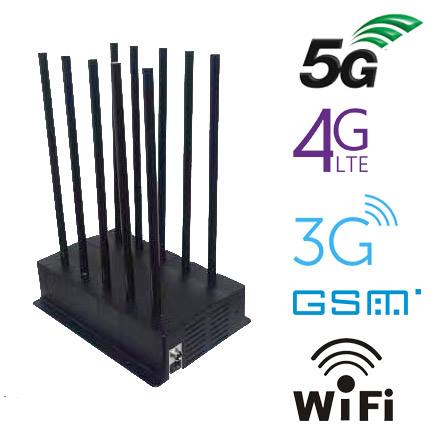Drones can pose risks to human health and safety. They are also frequently used to monitor and obtain vulnerable information from protected areas, such as military bases, and cause casualties through explosives. Therefore, the field of drone jammer is developing rapidly, especially in the military field.Nets
The military often uses this drone detection solution to capture drones. When the net hits the drone, it stops it and makes it fall to the ground. Thanks to this, it is easy to prevent the drone from returning to the sender and prevent vulnerable information from leaving the military station, or worse, prevent physical damage from explosives carried by the drone.
Pros: When the drone is physically captured, there is very little risk of returning to the sender or causing casualties in the event of an explosion. Additionally, using the web can help find and prosecute senders. Ground-launched net cannons are highly accurate.
Disadvantages: The reloading time of the drone network is long, so if there is more than one drone, or if it is not caught at the first time, the threat still exists.
Radar
Radar uses radio energy to locate objects. With the help of radar, the orientation and position of the drone can be measured. Most radars send radio signals and "listen" for the echoes. However, they rarely choose small goals. Radar is designed to track larger objects such as airliners. However, the military also uses radar to locate small drones that may be in the area.
Four Major Anti-UAV Technologies - Radar Advantages: Radar helps to cover wide terrain. They provide accurate positions and can locate multiple targets simultaneously. Because the defense has to be as strict as possible
Radar is a great solution regardless of the weather, even in poor visibility conditions like fog, night, etc.
Cons: Most radars cannot distinguish between small drones and small flying animals like bats or birds. Therefore, radars may not be efficient enough for the military, as they may miss small drones.
High Power Microwave (HPM)
High-power microwave equipment can damage other electronic equipment, such as drones. HPM may interfere with the radio link for manipulating the drone. Due to the high voltage and current of the HPM, the HPM usually destroys the drone. Thanks to this, dangerous situations can be avoided, for example, when a suspicious drone enters a nearby area.
Pros: Effectively deter drones within HPM range.
Cons: While this technology can protect military bases and high-security areas, it can compromise other electronic devices and even destroy them accidentally and unintentionally. In addition, HPM can interfere with communication signals
GPS Spoofer
Thanks to this technology, a signal is sent to the suspiciously detected drone and misleads its whereabouts. Since GPS coordinates are dynamically alerted, a spoofer can take control of the drone. In this way, equipment can be moved from the area to a "safe zone", reducing the risk posed by the presence of drones.

Pros: GPS spoofers are one of the most affordable technologies. As an effect, they can be purchased in bulk by the military and used in various places.
Cons: Unfortunately, there is a risk of interfering with other radio communication signals.
The drone jammer can detect the presence of drones at a distance of about 3 kilometers and MUAVs at a distance of 20 kilometers, depending on the environmental conditions and the flying altitude of the drone. This provides accurate situational awareness and time to react to threats.
- Passive RF sensors scan the area for electromagnetic signals that can be identified as drone communications. When a threat is identified as a drone, the direction of arrival is clearly shown to the system operator to take action. By installing several RF sensors, the detection range can be extended, and through triangulation, the location of the drone can be precisely determined.
Related Articles
How drone jammers work against drones?
What do you need to disable bombing drones?
Drone jammers are used by troops
The Necessity of Drone Jammers in Prisons







